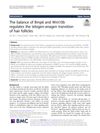 15 citations,
November 2017 in “Drug Development and Industrial Pharmacy”
15 citations,
November 2017 in “Drug Development and Industrial Pharmacy” Improved tablets lead to faster, better drug absorption for hair loss treatment.
 7 citations,
January 2015 in “Biological & Pharmaceutical Bulletin”
7 citations,
January 2015 in “Biological & Pharmaceutical Bulletin” Rice Bran Supercritical CO2 Extract significantly increased hair density and diameter in male alopecia patients without any side effects.
 5 citations,
January 2012 in “Hair therapy & transplantation”
5 citations,
January 2012 in “Hair therapy & transplantation” Hair mesotherapy might help with certain types of hair loss but lacks strong scientific proof and has some risks.
 2 citations,
February 2017 in “International Journal of Molecular Sciences”
2 citations,
February 2017 in “International Journal of Molecular Sciences” Erdr1 could be a new marker for diagnosing hair loss.
 May 2023 in “Animal Reproduction Update”
May 2023 in “Animal Reproduction Update” High levels of cortisol in hair show long-term stress which can lower fertility in animals.
 January 2021 in “Journal of cosmetology & trichology”
January 2021 in “Journal of cosmetology & trichology” Ageratum conyzoides L. extract may effectively and safely treat hair loss.
 January 2011 in “Springer eBooks”
January 2011 in “Springer eBooks” Eating a balanced diet with the right vitamins and minerals is important for healthy hair, but too many supplements can be harmful.

Acidic sandy clay damages archaeological hair the most, while dry conditions preserve but make it brittle; silicone oil can help keep the hair flexible.
 113 citations,
November 2017 in “Scientific Reports”
113 citations,
November 2017 in “Scientific Reports” Tiny particles from stem cells help activate hair growth cells and encourage hair growth in mice without being toxic.
 92 citations,
September 2019 in “ACS nano”
92 citations,
September 2019 in “ACS nano” A wearable device using electric stimulation can significantly improve hair growth.
 35 citations,
February 2019 in “Cell Communication and Signaling”
35 citations,
February 2019 in “Cell Communication and Signaling” BMP6 and Wnt10b control whether hair follicles are resting or growing.
 32 citations,
December 2013 in “Biological & Pharmaceutical Bulletin”
32 citations,
December 2013 in “Biological & Pharmaceutical Bulletin” Rice bran extract can potentially treat hair loss by promoting hair growth and increasing the number of hair follicles.
 4 citations,
January 2014 in “The Scientific World Journal”
4 citations,
January 2014 in “The Scientific World Journal” Red deer antler extract helps hair grow by extending the growth phase and increasing cell growth in hair follicles.
 2 citations,
June 2022 in “Scientific reports”
2 citations,
June 2022 in “Scientific reports” Women with PCOS have higher hair cortisol levels, which are linked to worse metabolic and inflammatory conditions.
 June 2023 in “Sains Malaysiana”
June 2023 in “Sains Malaysiana” Cinchonine Nanostructured Lipid Carriers serum safely and effectively stimulates hair growth and increases the number and size of hair follicles.
 37 citations,
April 2013 in “Plastic and Reconstructive Surgery”
37 citations,
April 2013 in “Plastic and Reconstructive Surgery” Genetic and environmental factors, like smoking and exercise, affect male hair loss.
 14 citations,
May 2022 in “Asian Journal of Pharmaceutical Sciences”
14 citations,
May 2022 in “Asian Journal of Pharmaceutical Sciences” New hair follicle-targeting treatments show promise for hair disorders but need more research on safety and effectiveness.
 August 2022 in “Gene Reports”
August 2022 in “Gene Reports” New hair loss treatments could be improved by using combined biological markers.
 February 2023 in “International Journal of Pharmaceutics”
February 2023 in “International Journal of Pharmaceutics” A new version of minoxidil, a hair loss treatment, was made using nanotechnology. This version, called minoxidil cubosomes, works better and causes fewer skin reactions than the old version. It also penetrates and stays in the skin better, promoting hair regrowth. It's safe and could be a good alternative to current treatments.
 61 citations,
May 2007 in “Journal of Pharmaceutical Sciences”
61 citations,
May 2007 in “Journal of Pharmaceutical Sciences” Different forms of hair loss drug can improve effectiveness.
 24 citations,
February 1987 in “Drugs”
24 citations,
February 1987 in “Drugs” Minoxidil promotes hair regrowth, but more research needed for effectiveness and response factors.
 19 citations,
May 2021 in “Clinical, Cosmetic and Investigational Dermatology”
19 citations,
May 2021 in “Clinical, Cosmetic and Investigational Dermatology” Minoxidil and finasteride are the best for non-scarring hair loss; more research is needed for scarring hair loss treatments.
 1 citations,
October 2010 in “Series in cosmetic and laser therapy”
1 citations,
October 2010 in “Series in cosmetic and laser therapy” Mesotherapy is a minimally invasive treatment with potential benefits and risks, requiring standardized practices and further investigation.
3 citations,
August 2022 in “International Journal of Molecular Sciences” COVID-19 can cause hair loss, and treatments like PRP and stem cells might help.
 1 citations,
January 2022 in “Stem cell biology and regenerative medicine”
1 citations,
January 2022 in “Stem cell biology and regenerative medicine” New methods to test hair growth treatments have been developed.
 1 citations,
February 2017 in “MOJ bioequivalence & bioavailability”
1 citations,
February 2017 in “MOJ bioequivalence & bioavailability” Treating hair loss effectively may require a multi-sided approach, using different treatments together, and topical treatments could be more effective and safer than oral ones.
May 2021 in “F1000Research” The treatment led to denser, thicker hair growth and less hair loss.
 10 citations,
December 2020 in “Dermatologic Therapy”
10 citations,
December 2020 in “Dermatologic Therapy” Minoxidil and spironolactone combo effectively treats androgenetic alopecia, improving hair density and diameter.
 November 2024 in “Clinical Cosmetic and Investigational Dermatology”
November 2024 in “Clinical Cosmetic and Investigational Dermatology” Rosemary oil may effectively treat hair loss with fewer side effects, but more research is needed.
 May 2023 in “Journal of Ethnopharmacology”
May 2023 in “Journal of Ethnopharmacology” The wild garlic plant, Allium macrostemon Bunge, can promote hair growth and could potentially be used to treat hair loss.




























